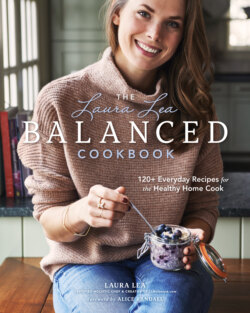Читать книгу The Laura Lea Balanced Cookbook - Laura Lea - Страница 24
На сайте Литреса книга снята с продажи.
Оглавлениеhemp, sesame, and chia seeds. This also
includes nut and seed butters, such as almond
or tahini (ground sesame paste). Peanuts are
technically a legume, but they’re generally
enjoyed as a nut, so I include them here. I
digest and tolerate nuts and seeds well, so you
will see them throughout this book. However,
nuts and seeds also contain phytic acid, and
some people have a difficult time digesting
them. If this is you, you can consider soaking
your nuts and seeds, which makes them
easier on your gut. I usually soak 2 cups of
nuts or seeds in 4 cups of filtered water with
1 tablespoon sea salt. Soak, uncovered, at
room temperature overnight. Drain and rinse
thoroughly, and then place them in an even
layer on a baking sheet on the counter until
they dry out for a few hours.
note: My recipes do not call for soaked
nuts or seeds, so your outcome might be
different if you take this step before cooking.
Beans and legumes: I keep things simple when
it comes to beans and legumes, which are a
quick and easy source of plant-based protein
and fiber. I purchase bulk amounts of organic
BPA-free canned black beans, chickpeas, and
lentils, and I use them for hummus, soups,
and even my famous black bean brownies
(page 341). BPA refers to bisphenol A, a harmful chemical found in many packaged products. I know that canned food in general isn’t ideal, but this is where balance comes into practice: I am so careful about the quality of my meat, vegetables, home and beauty care products, etc., so if canned beans help me skip a step when I’m cooking in a hurry, I’m not going to worry about their imperfections. That said, you can absolutely cook your own beans
and legumes. The Kitchn (thekitchn.com) has a great article on scratch-cooking beans that I trust. You will see a few recipes in this book that use dry red lentils, which cook quickly and are extremely versatile.
note: Beans and legumes also contain
phytic acid, which can cause digestive distress
in some. If this is you, and you still want to use
canned beans, just be sure to drain and rinse
them extra-thoroughly.
Eliminate or minimize as much as possible:
• Industrial, factory-farmed meat and poultry.
These proteins can contain all manner of
chemicals and harmful fatty acids, and
they do not contain the beneficial nutrient
profile of their properly fed, pasture-raised
counterparts. Factory-farmed eggs are one
of the top allergens as well. Perhaps most
importantly, most of these operations do not
prioritize animal welfare, and I do not want
to support the continuation and growth of
any such practices.
• Larger fish and endangered species. In the
seafood arena, enjoy larger fish, such as tuna
and swordfish, in moderation. These larger
fish tend to contain more toxins because
they are higher on the food chain. Also, steer
clear of endangered species (check fws.gov/ endangered). As with meat and poultry, farmed seafood is likely fed an unnatural diet, which means you’re not receiving the nutrition you deserve. For more information sourcing sustainable seafood in your area, I recommend visiting seafoodwatch.org.
